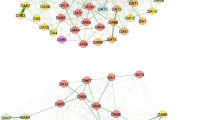Abstract
Nineteen depressed community volunteers received a replication of the cognitive therapy group treatment used by Shaw (1977). Two groups were created based upon a median split of pretreatment scores on the Dysfunctional Attitude Scale (Weissman & Beck, Note 1). The Beck Depression Inventory, Hamilton Rating Scale for Depression, Hopelessness Scale, and Social Adjustment Scale were administered prior to and following a 4-week treatment and following a 4-week follow-up. Subjects with higher initial levels of dysfunctional attitudes evidenced a poorer response to the treatment than their attitudinally more functional counterparts. This result was robust and held over a residual gain scoring procedure. Results lend support to the hypothesis that dysfunctional attitude level acts as a general psychopathological indicator.
Similar content being viewed by others
Reference Notes
Weissman, A., & Beck, A. T.Development and validation of the Dysfunctional Attitude Scale. Paper presented at the Annual Meeting of the Association for the Advancement of Behavior Therapy, Chicago, 1978.
Silver, R. J., Isaacs, K., Sufrin, E., Mansky, P., & Carotenuto, R.Cognitive structure in deparession. Paper presented at the Annual Meeting of the Association for the Advancement of Behavior Therapy, Toronto, November 1980.
References
Beck, A. T.Depression: Causes and treatment. Philadelphia: University of Pennsylvania Press, 1967.
Beck, A. T., Rush, A. J., Emery, G., & Shaw, B. F.Cognitive therapy of depression. New York: Guilford Press, 1979.
Beck, A. T., & Greenburg, R. L. Coping with depression. In A. T. Beck, A. J. Rush, B. F. Shaw, & G. Emery,Cognitive therapy of depression: A treatment manual. Philadelphia: Center for Cognitive Therapy, 1978.
Beck, A. T., Kovacs, M., & Weissman, A. Hopelessness and suicidal behavior: An overview.Journal of the American Medical Association 1975,234 561–571.
Coyne, J. C. Depression and the response of others.Journal of Abnormal Psychology 1976,85 186–193.
Ferster, C. B. A functional analysis of depression.American Psychologist 1973,28 857–870.
Hamilton, M. A rating scale for depression.Journal of Neurosurgery and Psychiatry 1960,23 56–62.
Hamilton, M. Development of a rating scale for primary depressive illness.British Journal of Social and Clinical Psychology 1967,6 278–296.
Hammen, C. L., Jacobs, M., Mayol, A., & Cochran, S. D. Dysfunctional cognitions and the effectiveness of skills and cognitive-behavioral assertion training.Journal of Consulting and Clinical Psychology 1980,48 6, 685–695.
Kovacs, M. Treating depressive disorders: The efficacy of behavior and cognitive therapies.Behavior Modification 1979,3 4, 496–517.
Kovacs, M., & Beck, A. T. Maladaptive cognitive structures in depression.American Journal of Psychiatry 1978,135 5, 525–533.
Lewinsohn, P. M. The behavioral study and treatment of depression. In M. Hersen, R. M. Eisler, & P. M. Miller (Eds.),Progress in behavior modification (Vol. 1), New York: Academic Press, 1974. Pp. 19–64.
Paykel, F., Weissman, M. M., & Prusoff, B. Social maladjustment and severity of depression.Comprehensive Psychiatry 1978,19 121–128.
Rehm, L. P. Assessment of depression. In M. Hersen & A. S. Bellack (Eds.),Behavioral assessment: A practical handbook (1st ed.). New York: Pergamon, 1976.
Rehm, L. P., & Kornblith, S. J. Behavior therapy for depression: A review of recent developments. In M. Hersen, R. M. Eisler, & P. M. Miller (Eds.),Progress in behavior modification (Vol. 7). New York: Academic Press, 1979.
Shaw, B. F. Comparison of cognitive therapy and behavior therapy in the treatment of depression.Journal of Consulting and Clinical Psychology 1977,45 543–551.
Spitzer, R. L., Endicott, J., & Robins, E. Research diagnostic criteria: Rationale and reliability.Archives of General Psychiatry 1978,35 773–782.
Tucker, L., Demarin, F., & Messich, S. A base free measure of change.Psychometrika 1966,31 457–473.
Weissman, M. M., & Bothwell, A. Assessment of social adjustment by patient self-report.Archives of General Psychiatry 1976,33 1111–1115.
Weissman, M. M., Prusoff, B., Thompson, W., Harding, P., & Myers, J. Social adjustment by self-report in a community sample and in psychiatric outpatients.Journal of Nervous and Mental Disease 1978,166 5, 317–326.
Author information
Authors and Affiliations
Additional information
Appreciation is expressed to R. Eric Nelson for his contribution as a member of the investigator's dissertation committee, to Brian Shaw for his treatment outline, to Richard Haase for his statistical assistance, and to Richard Heimberg for comments on an earlier draft.
Rights and permissions
About this article
Cite this article
Keller, K.E. Dysfunctional attitudes and the cognitive therapy for depression. Cogn Ther Res 7, 437–444 (1983). https://doi.org/10.1007/BF01187171
Issue Date:
DOI: https://doi.org/10.1007/BF01187171




